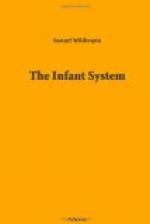With his hands and his feet he can run,
jump, and crawl,
He can dance, walk, or caper, or play
with his ball;
Take your hoop or your cart, and have
a good race,
And that will soon give you a fine rosy
face.
Oh! what would my boy do without his two
hands;
And his two little feet upon which baby
stands!
They’re the gift of kind heaven
for you to enjoy,
Then be thankful to heaven, my dear little
boy.
Having done a lesson or two this way, they are desired to put their arms out straight, and to say, one and one are two, two and one are three, three and one are four, four and one are five, five and one are six, six and two are eight; and in this way they go on until they are desired to stop.
It should be observed, that all graceful actions may be adopted. I am sorry to find, from visits to various schools, that the movements of the children have degenerated into buffoonery; they have been allowed to put themselves into the most ridiculous postures, and have thus raised objections which would not otherwise have been urged. As, however, the whole Infant System is designed to make the children think, I would urge the teachers to guard against their being automatons. Let them mark every impropriety with promptitude, and correct it with judgment.
I have specified these methods not as being the only ones practicable, or fit to be adopted, but merely, as hints to the judicious teacher, who will doubtless think of many others, conducive to the same end: and the more he can diversify them the better. It is the combination of amusement with instruction, which, in my opinion, renders the system so successful; and unimportant or improper even as it may appear to some, is of more real service in the management of young children, than all the methods of restraint and coercion, which have been hitherto but too generally pursued.
The children may also learn the pence and multiplication tables, by forming themselves into circles around a number of young trees, where such are planted in the play-ground. For the sake of order, each class should have its own particular tree; that when they are ordered to the trees, every child may know which tree to go to; as soon as they are assembled around the trees, they are to join hands and walk round, every child saying the multiplication table, until they have finished it; they then let go hands, and put them behind, and for variety’s sake, sing the pence table, the alphabet, hymns, &c. &c.; thus the children are gradually improved and delighted, for they call it play, and it is of little consequence what they call it, so long as they are edified, exercised, and made happy.
This plan is calculated to impress the lessons on their memories, and is adapted for fine weather, when they can go out to play, as it is called. But as in wet or snowy weather, they cannot go out of the school, we then have recourse to the mode previously mentioned. Besides it is necessary that children should have exercise in winter as well as in summer, in wet as well as in dry weather; for this purpose we have several swings in the school-room, made of cord only, on which the children are allowed to swing, two at a time. The time that they are permitted to be on the swing, is according to what they have to repeat. If it is the pence table, they say—




